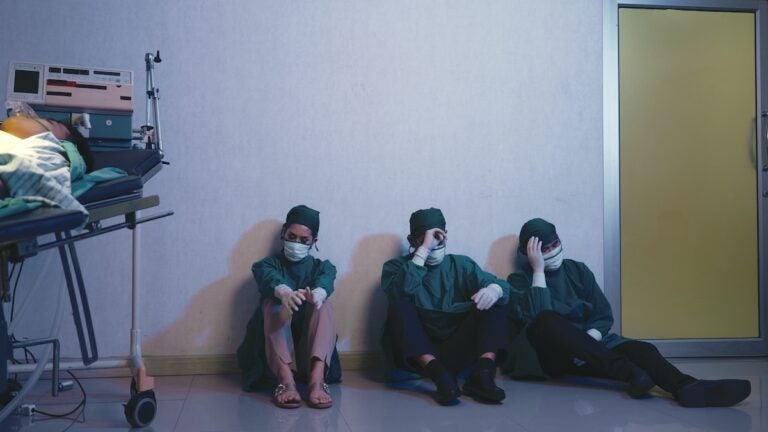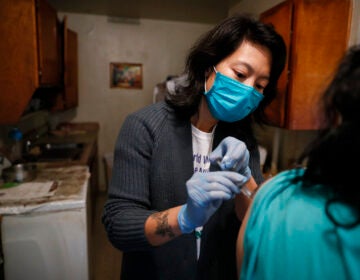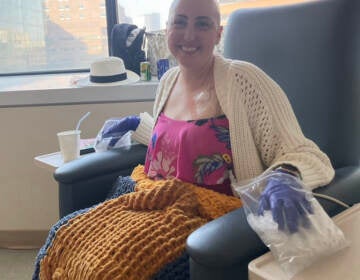From mistakes to depression, anonymous support groups are tackling physician’s mental health
When Psychiatrist Mona Massood saw so many doctors suffering from anxiety and depression, she created a 24/7 physician support line to help them.
Listen 7:46
Surgical team tired and overworked after operation. (Bigstock/Sorapop)
This story is from The Pulse, a weekly health and science podcast.
Find it on Apple Podcasts, Spotify, or wherever you get your podcasts.
Pediatrician Joe Sherman was working at an outpatient pediatric clinic — decades into his career — when he realized that juggling the demands of teaching, completing administrative work, and taking care of patients was becoming totally overwhelming.
“The more that I tried to make up for deficiencies within the system I was working, I became more and more anxious. The more disconnected I became, the more dissociated I became a bit. And that becomes very distracting,” Sherman said.
He couldn’t keep up. Even his commute was impaired.
“I can tell you at the peak of my anxiety that I was experiencing, I had fender benders. I would be driving down the street, and in my mind, would be in three different places worrying about things, and all of a sudden, [crash]. Nothing dangerous, but I just wasn’t paying attention.”
Beyond some minor car accidents, Sherman was worried about the impact of his anxiety on his performance as a physician. Without adequate support staff, he was unable to concentrate and feared his performance could slip.
“Whether you’ve made a mistake or you’ve been accused of having a medical error that in and of itself causes tremendous anxiety again because we are brought up in a culture where mistakes are unacceptable.”
Psychiatrist Mona Massood says this is a message that is internalized by a lot of physicians.
“We’ve kind of drank the Kool-Aid ourselves that we cannot make mistakes and we cannot be human. That it makes you a bad physician, but worse, it makes you a bad person. That’s what really is behind all of this stigma,” Massood said.
Finding support
Keeping quiet about these struggles can seem like the only option in a profession where new hires have historically been required to disclose if they have sought treatment for mental health issues and doing so could create a stain on your resume.
But then the pandemic started. Hospitals swelled over capacity. Physicians worked tirelessly.
Between shifts and behind usernames, doctors took to private social media groups to discuss COVID-19 more informally — which treatments seemed to be working and which were not.
Massood had joined some of those forums, and given her training, she picked up on a dark undercurrent beneath all the clinical talk.
Subscribe to The Pulse
“What I saw was that physicians were struggling with their own anxieties about their mortality, worried about making mistakes and not being able to help people or, God forbid, harming their patients.”
Online, Massood saw a nation of doctors stretched to unimaginable lengths and caught in a vicious cycle — all while trying to remain stoic. Massood saw the signs of a desperate need for an outlet for their stress and anxiety, a safe place to share and vent.
So she posted in one of those groups asking if other psychiatrists wanted to join her in building that space.
“The response was kind of remarkable,” Massood said.
Within one week, 200 psychiatrists responded, and together they launched the Physician Support Line – a 24/7 free peer-to-peer service that allows physicians to call in and talk about everything from their own mental health, burnout to mistakes.
“Physicians listening to physicians anonymously, unapologetically, without fear of being reported,” she said.
Massood wasn’t the only person who saw signs of crisis among health care providers during the early days of the pandemic.
“Not having enough vaccinations, not having enough PPE, not having enough oxygenation systems, right? When they know that that’s what their patients need. But they can’t provide it, that’s moral distress,” said Amy King, a psychologist who specializes in pediatrics and trauma.
King started working with health organizations and physicians a decade ago when she realized the unmet needs of the health care workers she was instructing.
“Because you can imagine if a physician is trying to address trauma and stress in their patients, but haven’t yet done so for him or herself, it becomes pretty challenging,” said King.
Today, King helps facilitate anonymous drop-in Zoom sessions for Physicians Anonymous, another organization started in the wake of the pandemic working to reduce the alarming rise in burnout, moral injury, and even suicide among physicians.
She says one issue that comes up frequently is the veil of silence that so many physicians live under after mistakes happen.
“If you can imagine making some kind of a mistake that is dire or hurts or harms your patient somehow and that your ethical heart would like to take responsibility for that,” said King. “And yet you’re being told by all of your liability and HR and litigation teams that you can’t admit fault. That’s distressing to our nervous system. It feels out of alignment with what we want to be able to do as human beings.”
Pediatrician Joe Sherman, who started getting into fender benders at the height of his own burnout, also works with Physicians Anonymous, co-facilitating sessions with King.
His hunch about the impact of physicians being squeezed, how juggling too many tasks affect patient care has been backed up. In 2018, researchers at Stanford found that doctors who self-reported having made a mistake were more than twice as likely to also report struggling with burnout.
Sherman has since reduced his hours as a pediatrician to part-time and started coaching other physicians, in addition to facilitating those sessions with Physicians Anonymous.
“It’s an opportunity for physicians who are struggling with burnout, with mental illness, mental distress in a group where all are welcomed and that container is set so that they’re able to share and heal,” Sherman said.
Code of silence
Amy King says doctors are typically incentivized to stay quiet about their mental health struggles and concerns about their performance.
Many state medical boards and health organizations still require doctors to reveal information about their mental health, despite official recommendations from oversight agencies against doing so.
“There’s an inherent system that’s set up that says, don’t suffer. And certainly, if you suffer, don’t reach out for help. And that’s pretty dangerous.” King said.
For now, Amy says grassroots efforts like Physicians Anonymous are providing doctors a lifeline and protecting patients, too.
“The research is really clear. When we provide space for physicians to reflect on what’s gone well, what’s gone right, what’s gone wrong, to have those ability to debrief without condemnation, without shame, without judgment, they feel more capable, more competent, more confident.” King said.
Mona Massood, founder of Physicians Support Line, has been working with other physician-led organizations to change the way state licensing boards treat doctors who have sought mental health treatments.
“To make sure that they’re not being punitive in physicians seeking therapy or seeking medication management for their mental health,” she said.
WHYY is your source for fact-based, in-depth journalism and information. As a nonprofit organization, we rely on financial support from readers like you. Please give today.







